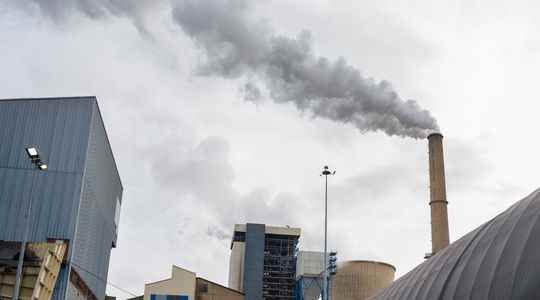In recent years, coal seemed to be on its way out in much of the world, but it could be making one last comeback. Germany took emergency measures on Sunday, June 19 to secure its energy supply in the face of recent drops in gas deliveries by the Russian group Gazprom. This implies in particular increased use of the most polluting of energies, the coal.
“To reduce gas consumption, less gas must be used to produce electricity. Instead, coal-fired power plants will have to be used more,” the economy ministry said in a statement on Sunday. The temporary use of coal marks a 180 degree turn for the government ofOlaf Scholz who, an ally of the Greens, has promised to phase out coal by 2030 to fight against climate change.
But the environment seems to have to wait in the context of the war in ukraine, after the Russian giant decided to turn off the gas tap. Claiming a technical problem, the group reduced its shipments by 40%, then 33%. This decision had a heavy impact on several European countries, in particular Germany, Italy and France, which no longer receives Russian gas.
The return of coal “without taboo” in the EU
In mid-May, Brussels gave the green light to the European Union to burn more coal over the next decade. “Coal is expected to produce an additional 100 terawatt hours annually, approximately the electricity consumption of Belgium, over the next five to ten years,” reports the FinancialTimes. Countries could “stay longer with coal” before switching to renewables to avoid dependence on gas, more than a third of which comes from Russia, European Commission President Frans Timmermans warned on March 3. on British radio BBC.
The European Union envisages “without taboo” the return to this source of electricity production which emits the most greenhouse gas effects, public enemy no. 1 for the climate. “Things have changed. I mean, history took a very sharp turn a week ago, and we have to accept this historic change,” added Frans Timmermans, while specifying the obligation to respect the objectives of emissions by consuming 55% less coal by 2030 than in 1990.
The reopening of coal and nuclear power plants is helping to replace Russian gas, confirms Thierry Breton, European Commissioner for the Internal Market. For its part, France seems to be preparing to resort more to black gold. The Saint-Avold coal-fired power plant, in Moselle, whose closure was scheduled for the end of March, could resume service next winter, the Ministry of Ecological Transition had indicated at the end of March.
Greece follows suit, soon Italy and France?
Mario Draghi, the Italian Prime Minister, could also reopen old coal-fired power stations in order to be less dependent on Russian gas. On April 4, the Greek government unveiled that it will boost coal mining and extend the operation of its coal-fired power plants until 2028, abandoning its previous plans to close some plants by 2028. ‘next year. “Greece produces around 10% of its electricity from lignite, the dirtiest form of coal”, specifies the FinancialTimes.
It must be said that coal represents a practical short-term substitute for Russian gas: burning carbon is less complicated than building new wind turbines and new solar panels. “Even taking into account the EU’s emissions trading scheme, under which energy producers have to pay to produce CO2, coal-fired power plants are cheaper than their gas-fired equivalents”, recalls The Economist.
An “illusory” investment
But this return to coal is castigated by the Secretary General of the United Nations, Antonio Guterres. Tuesday, June 14, he warned that it was “illusory” to invest money in coal, oil or gas to deal with the consequences of the war in Ukraine. He warned that the massive use of coal will only reinforce the “scourge of war, pollution and climate catastrophe”.
Already before the war in Ukraine, coal consumption had skyrocketed. According to data from the International Energy Agency (IEA), global electricity generation from coal grew by 9% in 2021. “Coal plays a systemic role in the global electricity model. gas having experienced extraordinary increases in 2021, it has become much more competitive in certain regions to run coal-fired power plants rather than gas-fired power plants”, analyzed Marc-Antoine Eyl-Mazzega, director of the energy & climate center of the Ifri, on February 7 in The Express.
According to the annual report of the REN21 network of experts published on Tuesday, the year 2021 has been disappointing for renewable energies. The share of these in global energy consumption stagnated in 2021, overtaken by the rebound of fossil fuels after the Covid-19.
